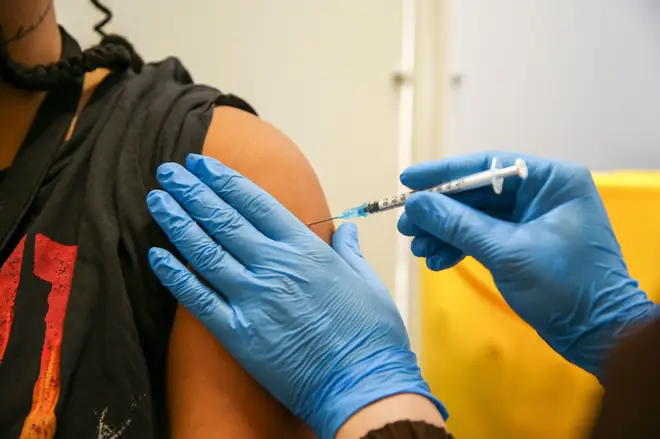
Nick Ferrari 7am - 10am
19 August 2021, 11:06

Research from the University of Oxford found that while Pfizer is more effective at fighting the Delta variant than AstraZeneca, those infected can still spread coronavirus.
Scientists have found that people with two Pfizer or AstraZeneca jabs can still spread coronavirus if they catch the Delta variant.
Research from the University of Oxford suggests that those infected with the Delta variant who have had both vaccines have similar peak levels of the virus as those who are unvaccinated.
According to researchers two doses of the Pfizer/BioNTech vaccine have greater efficacy against Covid-19 infections associated with the Delta variant when compared to the Oxford/Astrazeneca jab.
But they also found that the effectiveness of the Pfizer jab declines more quickly, as after four to five months the remaining level of protection is the same for both vaccines.
The findings have not yet been peer-reviewed.
READ MORE: Moderna vaccine approved for people aged between 12 and 17
READ MORE: No evidence Covid vaccines affect ability to have children, regulator says
The researchers concluded that jabs do not eliminate the possibility of contracting Covid-19, but that they do reduce the risk for those infected. They added that they are the most effective protection against the Delta variant.
Sarah Walker, professor of medical statistics and epidemiology at the University of Oxford, said: "We don't yet know how much transmission can happen from people who get Covid-19 after being vaccinated - for example, they may have high levels of virus for shorter periods of time.
"But the fact that they can have high levels of virus suggests that people who aren't yet vaccinated may not be as protected from the Delta variant as we hoped.
"This means it is essential for as many people as possible to get vaccinated - both in the UK and worldwide."

Pfizer, Moderna and AstraZeneca: The Coronavirus Vaccines Explained
The study, conducted with the Office of National Statistics (ONS) and the Department for Health and Social Care (DHSC), looked at data between December 2020 and August 2021. Over 700,000 swab tests were analysed from before and after May 17 2021, when Delta became the main variant in the UK.
For infections with a high viral load, protection for someone a month after their second Pfizer vaccine is 90% higher than someone who is unvaccinated, falling to 78% after month three. For Astrazeneca, the corresponding figures are 67% and 61%.
Dr Koen Pouwels, senior researcher at the University of Oxford's Nuffield Department of Population Health, said that the team "can be confident" that the numbers "really represent a decline" for the Pfizer vaccine, whereas for AstraZeneca "the differences are compatible with chance, that is there could be no change at all in the protection from AZ".
He added: "Even with these slight declines in protection against all infections and infections with high viral burden, it's important to note that overall effectiveness is still very high because we were starting at such a high level of protection.
"It is also worth highlighting that these data here do not tell us about protection levels against severe disease and hospitalisation, which are two very important factors when looking at how well the vaccines are working."
According to the research, those aged 18-34 receive more protection from being double-jabbed than older people (35-64).
Scientists also found that a single dose of Moderna has similar or greater effectiveness against the Delta variant as other vaccines, but data for those with two jabs is not yet available.
In the UK, over 47 million people have received one dose of the coronavirus vaccine, and over 40 million are now fully vaccinated.